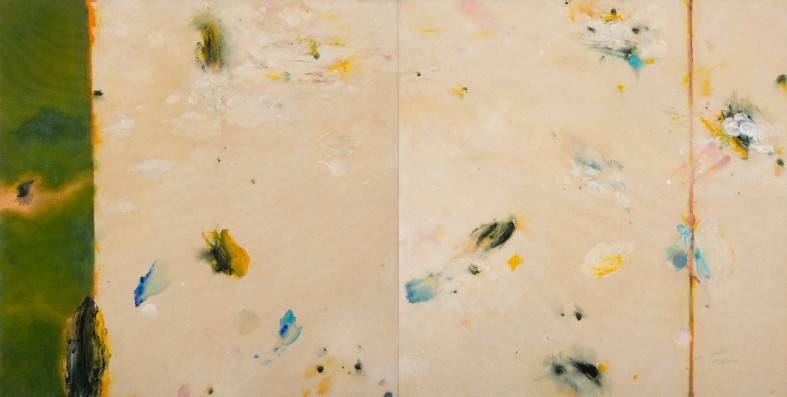
Hanibal Srouji
With Srouji the piece he is presenting seem to send out contradictory signals. We’re greeted by medium-format work whose shimmering colors and movement could be a reference to romantic seascapes. Far from realism, we are invited to plunge into a visual imaginary of musical composition and contemplate pieces of land, sea and sky, where spaces are intertwined, temporal dimensions altered and the human figure excluded.
He seduces us - or tries to seduce us - with his “beautiful manners”, Srouji here inscribes his practice with an economy of means, as if to show what is not, or what is no longer. One fact is worth mentioning: the artist here integrates the element of fire as an integral tool in his creation. Healing Bands - free floating canvases, burnt and nailed to the wall.
Fire is already a marking technique; here, it’s a subject that goes back to the journey of the artist, his generation and possibly those that followed, who saw and experienced successive Naqbas hit the country and the region.1 In other words, being born in this part of the world is synonymous with an obligation to live in uncertainty and chaos, with departure as the only hope of salvation, another romantic idea, where elsewhere would always be better. Twenty years earlier, Samir Kassir wrote that “it’s not good to be an Arab these days. (...) Whichever way you look at it, the picture is bleak, and even bleaker when compared with other parts of the world.”2
Since the late 80s of the previous century, Srouji has been attempting to address this troubling question of identity and belonging. Subsequently, he has always flirted with the idea of beauty, expression and emotion, to sublimate real violence. His paintings refer to melodious, dissonant internal structures, as well as to questioning notions of space, composed and recomposed in a temporal and timeless flux.
1 The term Naqba or Nakba usually refers to the expulsion of the Palestinian people from their land in 1948. Used in the plural, it returns to its original meaning - catastrophe - to cover all the disasters that have taken place since.
2 Samir Kassir, Considérations sur le malheur arabe, Arles, Actes Sud / Sindbad, 2004, p. 9.